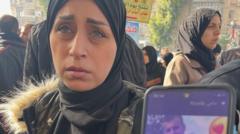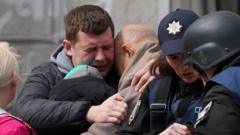In Damascus, grieving families visit Mustahed Hospital to identify missing relatives amid images of the dead, highlighting the lasting impact of more than five decades of violence under the Assad regime. Their search reveals immense suffering, underscored by hope for closure and justice in a nation scarred by loss.
Seeking Closure: Syrians Confront the Shadows of the Past

Seeking Closure: Syrians Confront the Shadows of the Past
Amid the remnants of Assad's brutal regime, families gather at a Damascus hospital in search of lost loved ones, chronicling the painful quest for identity and justice.
After 50 years of Assad's oppressive rule, Syrians find themselves in a tragic search for closure, as they flock to Mustahed Hospital in Damascus, hoping to find missing loved ones. Outside, a wall is painted with photographs of deceased men, whose faces bear gruesome signs of violence and suffering. Families brave the winter sun to inspect the images closely, hoping for a glimpse of someone they recognize. Some even take videos of the photographs while seeking second opinions on potential identifications.
The atmosphere in the hospital is heavy with grief and despair as relatives make their way through a mortuary that has exceeded its capacity, filled to the brim with bodies, some of which had been dead for weeks. Visitors examine the corpses, with some wrapped in shrouds that have fallen away, revealing unique identifiers such as tattoos or scars. The emaciated remains show signs of brutality, leaving doctors like Dr. Raghad Attar heartbroken as they work tirelessly to help families find solace.
Families enter the mortuary silently, moving from body to body, each holding onto the faint hope that they might recognize someone or at least find some answers about their missing relatives. Personal stories abound—like that of Noor, who has only received fragmented information about her brother, last seen alive in Sednaya prison over a decade ago. Each encounter serves as a painful reminder of the past, where disappearances and deaths have been a constant under Assad's rule.
As hope mingles with despair, stories unfold of families torn apart, like one of a man taken away for refusing to share his laptop password or a mother whose young son vanished at a regime checkpoint. Over half a century of the Assad family's reign has been marked by a culture of fear, oppression, and inhumanity, leaving countless families yearning for answers and justice.
Additionally, an exploration of the once grand yet now hollow presidential palace provides a glimpse into the stark divides between the lives of the elite in power and the suffering of ordinary Syrians. Documenting these harrowing realities, journalists witness the aftermath of a regime that has historically thrived on violence and subjugation.
As murmurs of possible executions of regime officials create fleeting hope for justice in a crowd eager for retribution, it becomes clear that even as the ashes of the Assad era linger, the desire for accountability will shape the future of Syria. The country's new leaders will face immense pressure, with a populace demanding justice not just for the actions of a few but for the collective anguish inflicted upon the nation over decades. How they respond might dictate Syria's path towards healing in a landscape rich with historical wounds.





















